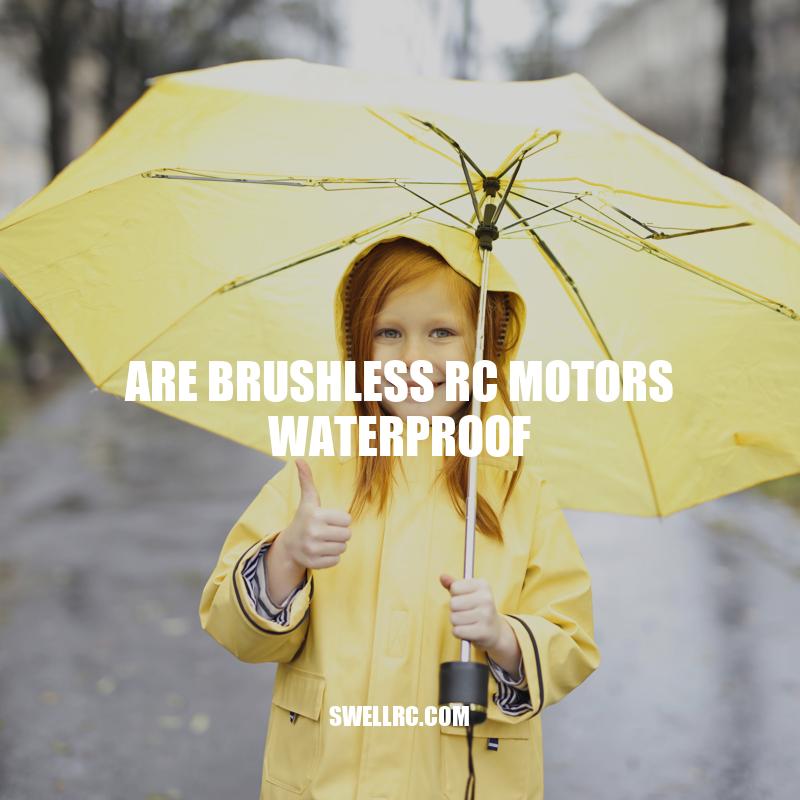Are Brushless RC Motors Waterproof? Exploring Waterproofing Techniques and Protection Tips
Brushless RC motors are becoming increasingly popular among remote control hobbyists. These motors rely on electronic speed controllers (ESCs) for their operation, producing higher speeds and more power than traditional brushed motors. However, when it comes to operating brushless RC motors near water, the question of whether or not they are waterproof becomes important. RC boats, for example, are often used in lakes and rivers where they are exposed to water. Similarly, remote control cars and quadcopters can encounter unexpected rain showers or puddles. The last thing any hobbyist wants is for their expensive brushless RC motor to become damaged by water. In this article, we will explore the question of whether or not brushless RC motors are waterproof and provide tips on how to protect them from water damage.
What is a Brushless RC Motor?
A brushless RC motor is a type of electric motor that uses electronic speed controllers (ESCs) instead of brushes to control the motor’s operation. Here are some key characteristics of brushless RC motors:
- Delivers higher speeds and more power
- Lack brushes, which can wear out over time
- More efficient, providing longer run times on a battery charge
- Produces less heat, resulting in less wear and tear on the motor
Brushless RC motors are commonly used in remote control cars, boats, quadcopters, and airplanes. They are favored by hobbyists because of their superior performance and durability compared to brushed motors. Some popular brushless RC motor brands include:
- Traxxas
- Hobbywing
- Castle Creations
- Team Orion
However, one of their biggest drawbacks is their vulnerability to water damage, especially when compared to brushed motors. In the next section, we’ll discuss why waterproofing is so important for RC motors.
What is a brushless electric motor?
A brushless electric motor is a type of motor that uses electronic commutation instead of traditional brushes to control the motor’s rotation. The advantages of brushless electric motors include higher efficiency, longer lifespan, and less noise. These types of motors are commonly used in various applications, such as drones, electric cars, and power tools.
If you’re interested in learning more about brushless electric motors, there are many resources available online. Check out websites like Electric Motor Warehouse or companies like Makita that offer brushless motor products.
Waterproofing RC Motors
Waterproofing is the process of making electric components, such as RC motors, resistant to water and other types of moisture. Waterproofing can be especially important for RC motors, which are often used outdoors and exposed to water, mud, and other weather conditions. Here are some of the methods used to waterproof RC motors:
| Method | Description |
|---|---|
| Soldering | Melting solder around electrical connections to create a protective barrier. |
| Conformal Coating | A thin, protective layer of material that is sprayed or brushed on the motor’s electrical components. |
| Waterproofing Spray | A spray that is applied directly to the motor’s electrical components to provide a waterproof barrier. |
| Silicone Sealant | Applying a silicone sealant around the motor’s electrical components. |
While waterproofing can help protect RC motors from water damage, it’s important to note that not all methods are foolproof. For instance, waterproofing sprays and conformal coatings can wear over time, leaving your motor vulnerable. Additionally, while soldering is an effective method, it can be time-consuming and difficult for beginners to master.
Can you waterproof an electric motor?
Yes, electric motors can be waterproofed. Here are some methods:
- Encapsulation: Coating the electronic components with a protective material.
- Conformal Coating: Applying a thin layer of protective coating on the circuit board.
- Vacuum Encapsulation: Placing the electronic components in a vacuum-sealed enclosure.
- IP Rated Enclosures: Using a specially designed enclosure that meets International Protection (IP) standards for water and dust resistance.
If you are looking for waterproof electric motors, check out websites such as ServoCity or Grainger for a range of options.
Are Brushless RC Motors Waterproof?
Many brushless RC motors are not waterproof, which can be frustrating for hobbyists who prefer to use their RC cars and boats in wet conditions. However, some manufacturers are beginning to produce waterproof brushless motors. Here are a few things to keep in mind:
– Brushless motors produce less heat than brushed motors, making them less prone to damage from water.
– Some brushless motors have a waterproof coating, but this may not be enough to completely protect the motor from water damage.
– If you plan to use your RC car or boat in water, it’s essential to take additional steps to protect your brushless motor from the elements.
When shopping for a brushless motor, it’s important to pay attention to the manufacturer’s specifications. Some motors will be labeled as waterproof or water-resistant, while others will not. If you’re not sure whether a particular motor is waterproof, it’s best to err on the side of caution and assume that it’s not. To further protect your motor from the elements, consider using a waterproof ESC, running your motor at lower power, or using additional waterproofing techniques, like conformal coating or silicone sealant.
Are Brushless Outrunner Motors Waterproof?
No, brushless outrunner motors are not waterproof. They are designed to operate in dry conditions and can be damaged if exposed to water or moisture. Waterproofing options are available, such as using waterproofing sprays or coatings, but these are not foolproof.
If you need a waterproof motor, it is best to look for one specifically designed and marketed as such. For example, the Aquacraft UL-1 Superior FE Hydro, the Dynamite Marine 6-Pole Waterproof Brushless Marine Motor, and the Turnigy AquaStar brushless boat motor all offer waterproof capabilities.
Always read the manufacturer’s instructions carefully to ensure that you are using the motor as intended and protecting it from any potential water damage.
Protecting Your Brushless RC Motor from Water Damage
While some brushless motors are waterproof, it’s important to take additional steps to protect your motor from water damage, especially if you plan to use it in wet conditions. Here are a few tips:
– Use a waterproof ESC to protect the motor’s electronic components from moisture.
– Consider using a waterproof servo to prevent water from entering the car or boat’s steering system.
– Use a waterproof receiver box to protect the receiver from water damage.
– Apply a waterproof coating, such as conformal coating or silicone sealant, to the motor to create an additional barrier against moisture.
– Use a low-power setting when using your brushless motor in water to reduce the risk of overheating.
It’s important to note that while these steps can help protect your brushless motor from water damage, they may not completely prevent it. Always use caution and avoid exposing your motor to excessive water or moisture. If you do accidentally get water inside your motor, it’s important to disassemble and dry it thoroughly before attempting to use it again. There are also products available online, such as waterproof sprays and sealants, that can help protect your brushless motor.
Can you waterproof a brushless motor?
Yes, brushless motors can be waterproofed with the use of a waterproof coating or enclosure. Some popular options include:
- Conformal coating
- Silicone sealant
- Waterproof motor covers
However, it is important to note that waterproofing a brushless motor may void its warranty or compromise its performance. It is recommended to consult the manufacturer’s guidelines or seek professional assistance before attempting to waterproof a brushless motor.
Conclusion
In conclusion, determining whether or not brushless RC motors are waterproof can be a bit tricky. While some brushless motors are designed to withstand moisture, not all are waterproof. However, there are steps you can take to protect your motor from water damage, such as using waterproof electronic speed controllers, servos, and receiver boxes, as well as applying a waterproof coating to your motor. Always exercise caution when using your brushless motor near water and take steps to minimize the risk of water damage. With the right precautions, you can enjoy the power and efficiency of a brushless RC motor without worrying about damaging it with water.



